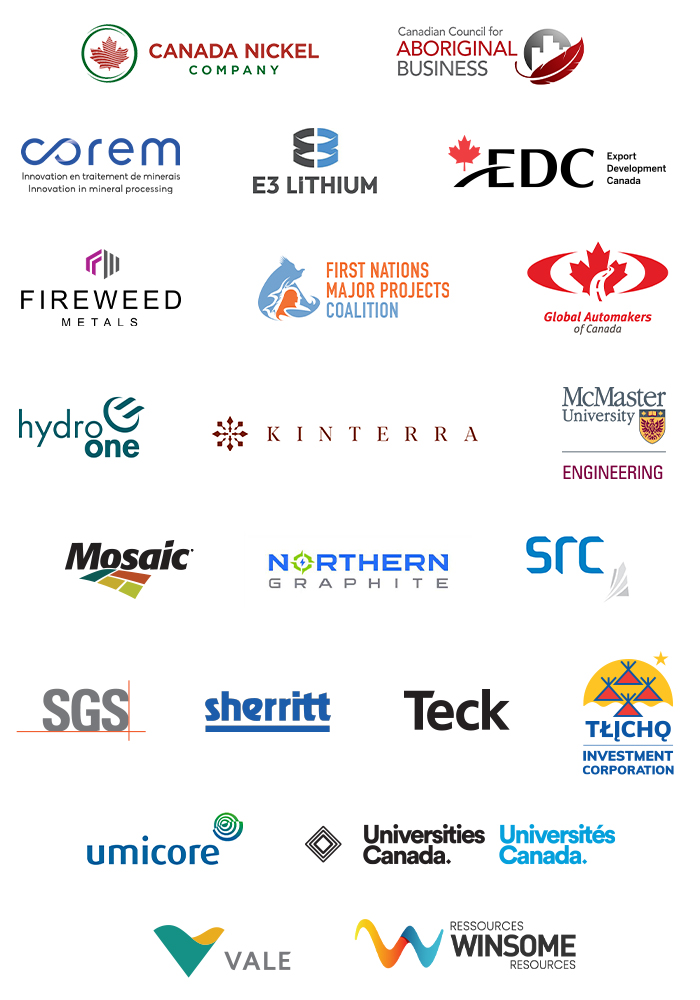The Council
Since its formation in 2022, the Critical Minerals Council has helped propel the sustainable development of critical mineral supply chains in Canada. The Council is committed to enhancing collaboration between upstream and downstream organizations, economic and environmental ambitions, and industry and Indigenous stakeholders.
The Canadian Chamber of Commerce and its members on the Critical Minerals Council have taken a leadership role in making recommendations on natural resources policy, including national procurement policies, export strategies, and environmental targets. The Council represents a forum of public and private sector leaders from all segments of the critical minerals supply chain, from mineral exploration to closed loop recycling.
Critical minerals enable the production of consumer products, defence and industrial applications, and our ability to transition to a low carbon economy. Executing an effective critical minerals strategy will facilitate investments required to expand national critical minerals stockpiles and supply chains while reinforcing Canada’s global brand as a sustainable supplier helping global partners transition to a low carbon future.
Policy Priorities
The supply of critical minerals is vital to the development and deployment of low carbon infrastructure. Solar, wind, and nuclear energy infrastructure all require critical minerals that are available in Canada. Ensuring the sustainable extraction and secure supply of these minerals will be essential to the decarbonization of energy production as well as the electrification of consumer transportation.
Government must:
- Accelerate clean energy projects.
- Incentivize consumers to recycle end-of-life products with critical mineral content.
- Incorporate environmental, social and corporate governance (ESG) support into the Mining Centre of Excellence.
- Support focused research and development for critical minerals.
Canada’s mining industry has built successful partnerships with Indigenous communities across Canada. The expansion of critical mineral supply chains will present continued and new opportunities for partnerships that can mutually advance community and economic development.
Government must:
- Incentivize partnerships with Indigenous communities that advance decarbonization projects and support economic reconciliation.
Innovation in the private sector is vital for the secure and sustainable supply of critical minerals.
Government must:
- Work with the business community to create a competitive environment for new investment in infrastructure and technologies.
- Ensure clearer plans, accelerated timelines, and firm commitments for infrastructure development in areas with high mineral potential.
- Advance implementation of the new and expanded investment tax credits (ITCs) as outlined in the 2023 Fall Economic Statement.
- Work closely with industry to develop and foster a regulatory framework built on a data-driven, performance-based approach that supports innovation and adapts to evolving technologies.
Developing critical mineral supply chains within Canada and North America will reduce Canadian dependence on the overseas exports that are vital for our continued way of life.
Government must:
- Offer tax incentives to encourage more critical minerals processing in Canada and secure the important midstream refining and processing part of the supply chain.
- Work with allies to advance resiliency and shared economic and environmental interests.
- Invest in expanding the reach and resilience of transportation and energy infrastructure to remote regions to allow for rare earth elements (REE) exploration, mining and delivery.
Canada’s natural resource companies must be able to meet the demands of international markets. We must provide our private sector with the tools to seize trade opportunities, while also ensuring that the trade of critical minerals does not face barriers and restrictions.
Government must:
- Work with major trading partners to advance the resiliency of critical mineral supply chains and extraction of critical mineral-based products by exploring the use of procurement, tax, and regulatory measures.
- Reduce or eliminate barriers and restrictions wherever possible to ensure Canada’s ability to trade critical minerals with international partners.
Co-Chairs

Marcella Munro
Teck Resources

David Anonychuck
SGS Canada
For more information on the Critical Minerals Council, please contact Bryan Detchou, Senior Director, Natural Resources, Environment & Sustainability.
Updates
OP-ED: When critical minerals meet critical infrastructure gaps in Canada, The Hill Times. Read more.
Policy Matters: Investing in the Next Generation of Skills and Technology for the Future of Mining. Read more.
Policy Matters: The Importance of Building Rare Earth Elements (REE) Supply Chain Resilience in Canada. Read more.
Video: Canadian Chamber of Commerce Appears Before Standing Committee on Natural Resources. Read more.
Report: Enhancing Domestic Critical Mineral Supply Chains. Read more.
Members

Related Campaigns & Councils

The Green and Transition Finance Council

Chief Financial Officers Council






